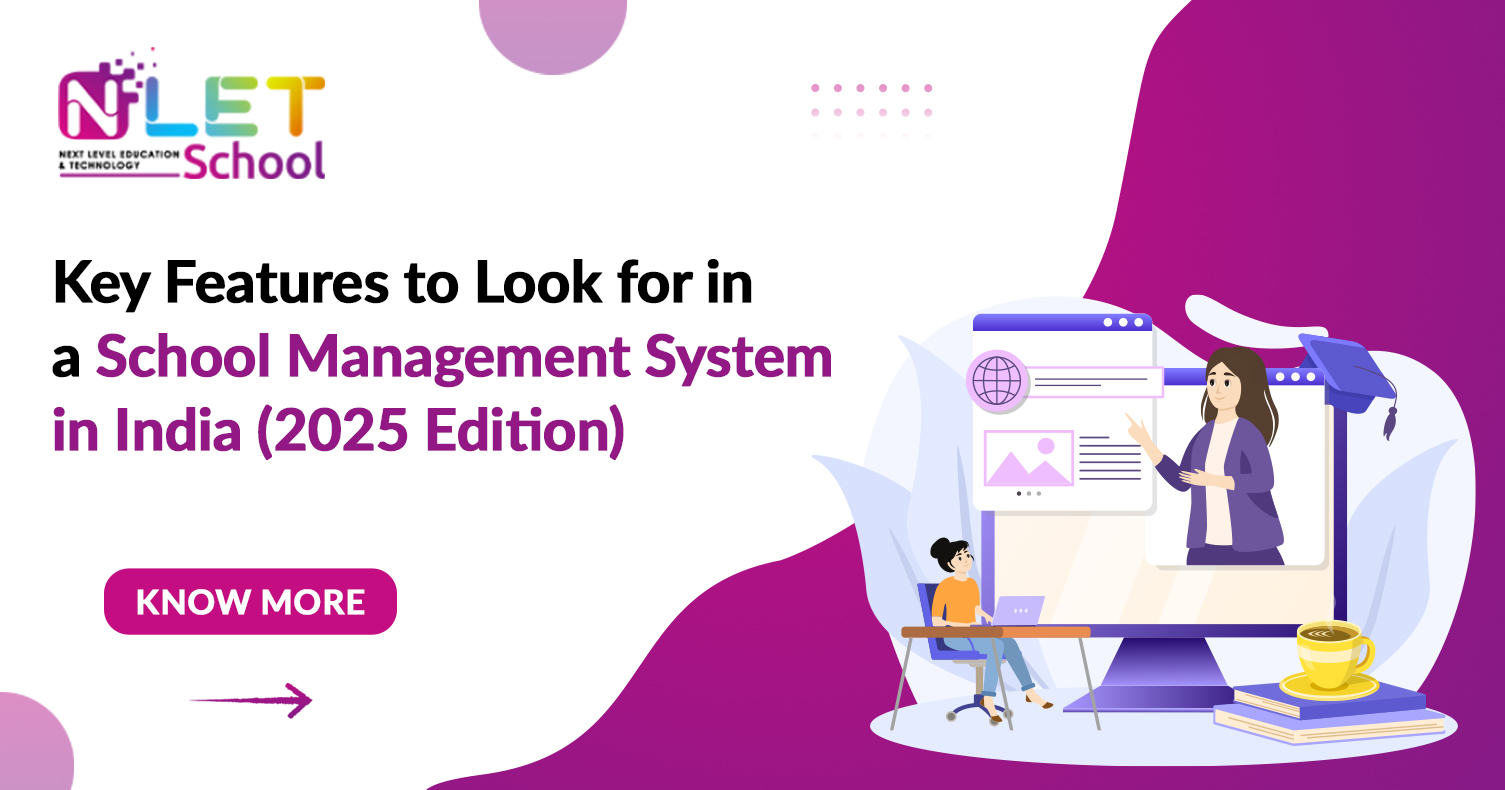How does a school management system work?
In the digital age, educational institutions are increasingly turning to technology to streamline their operations and enhance the learning experience. One of the most effective solutions is an Online School Management System, which integrates various administrative and academic functions into a single, cohesive platform. This advanced School ERP Software is designed to simplify complex processes, from student enrollment and attendance tracking to fee management and academic performance monitoring.
A robust student management system like the one offered by NLET not only automates routine tasks but also provides valuable insights into student progress and school operations. By leveraging cloud-based technology, these systems ensure that information is accessible anytime, anywhere, facilitating better communication between teachers, students, and parents. As we delve into how a School Management System works, we will explore its core functionalities and the benefits it brings to modern educational institutions.
Brief Overview of School Management Systems (SMS)
A School Management Software is a software solution designed to streamline and automate the various administrative, academic, and communication tasks within a school. It serves as a centralized platform that integrates all essential school functions, enabling efficient management and improved collaboration among teachers, students, parents, and administrative staff.
The primary goal of an SMS is to simplify the complex and time-consuming processes involved in running a school, such as student enrollment, attendance tracking, grade management, scheduling, fee collection, and communication. By digitizing these tasks, an SMS reduces paperwork, minimizes errors, and enhances the overall efficiency of school operations.
Modern School Management Systems are typically cloud-based, allowing access from any device with an internet connection, which is particularly beneficial for remote learning and administration. They offer a wide range of features that can be customized to meet the specific needs of different educational institutions, from small private schools to large public school districts.
In addition to administrative functions, SMS platforms often include tools for enhancing the learning experience, such as virtual classrooms, online assignments, and performance analytics. This holistic approach helps schools to not only manage their operations more effectively but also to provide a better educational experience for their students.
Importance of Efficient School Management
Efficient school management is crucial for the smooth operation and success of any educational institution. It involves the effective coordination of resources, staff, students, and processes to ensure that the school functions optimally. Here are some key reasons why efficient school management is important:
-
Enhanced Academic Performance: Efficient management ensures that resources are allocated effectively, and teachers are supported in their roles. This, in turn, creates an environment where students can thrive academically, with access to the necessary tools and support.
-
Streamlined Administrative Processes: Efficient management reduces the administrative burden on staff by automating tasks such as attendance tracking, fee collection, and report generation. This allows school administrators to focus on more strategic tasks, ultimately improving the overall operation of the school.
-
Improved Communication: Effective school management fosters clear and open communication between all stakeholders—teachers, students, parents, and administrative staff. This ensures that everyone is on the same page regarding school policies, events, and student progress, leading to a more cohesive and collaborative environment.
-
Better Resource Utilization: With efficient management, schools can make the most of their available resources, including time, money, and personnel. This not only helps in reducing waste but also ensures that resources are directed towards areas that will have the most significant impact on student learning and overall school improvement.
-
Enhanced Student Experience: Efficient management contributes to a positive student experience by ensuring that academic and extracurricular activities are well-organized and that students receive timely support when needed. This fosters a more engaging and supportive learning environment.
-
Data-Driven Decision Making: With an efficient management system in place, schools can collect and analyze data on various aspects of their operations. This data-driven approach enables school leaders to make informed decisions that enhance educational outcomes and operational efficiency.
-
Compliance and Reporting: Schools are required to comply with various regulations and reporting requirements. Efficient management ensures that these obligations are met in a timely and accurate manner, reducing the risk of penalties and ensuring that the school maintains its reputation.
Challenges Faced by Schools Without a School Management Software
Schools that operate without a School Management System (SMS) often encounter a range of challenges that can hinder their efficiency and overall effectiveness. These challenges include:
-
Manual Administrative Tasks: Without an SMS, administrative tasks such as attendance tracking, student enrollment, and grade management are often done manually. This process is time-consuming and prone to errors, leading to inefficiencies and the potential for mistakes that can impact student records and overall school operations.
-
Inefficient Communication: In the absence of a centralized system, communication between teachers, students, parents, and administrators can become fragmented and inconsistent. Important information may be delayed or lost, leading to misunderstandings and a lack of coordination within the school community.
-
Data Management Issues: Managing student data, staff information, and academic records manually can be overwhelming and disorganized. Without an SMS, schools may struggle to maintain accurate and up-to-date records, making it difficult to access important information quickly when needed.
-
Limited Access to Information: Without a digital platform, accessing important information such as student grades, attendance records, and school schedules can be challenging. Teachers and administrators may need to sift through physical records or rely on memory, which can slow down decision-making and lead to errors.
-
Challenges in Fee Management: Collecting and tracking school fees manually can lead to errors, discrepancies, and delays. Parents may not receive timely updates on fee payments, and the school may face difficulties in tracking outstanding payments, affecting its financial management.
-
Difficulty in Scheduling: Creating and managing class schedules, exams, and events can be a complex task without an SMS. Manual scheduling is not only time-consuming but also more likely to result in conflicts, double-bookings, or miscommunication about changes in the schedule.
-
Lack of Performance Insights: Schools without an SMS often lack the ability to easily analyze student performance data. This makes it difficult to identify trends, spot areas for improvement, and provide targeted support to students who may be struggling.
-
Increased Workload for Staff: Without the automation provided by an SMS, teachers and administrative staff face a heavier workload, leading to stress and burnout. This can impact their effectiveness and reduce the overall quality of education provided by the school.
-
Difficulty in Ensuring Compliance: Schools are required to comply with various regulations and reporting requirements. Without an SMS, ensuring compliance with these requirements can be a daunting task, potentially leading to legal or regulatory issues.
-
Limited Parental Engagement: Without a centralized system for communication and information sharing, parents may feel disconnected from their child’s educational journey. This can lead to decreased parental involvement, which is crucial for student success.
Core Features of a School Management System Software
A School Management System Software is equipped with a wide range of features designed to streamline the operations of educational institutions. These features are categorized into different modules to manage various aspects of school administration efficiently.
Student Information Management
Admission Management System
The SMS automates the admission process, from online application forms to enrollment and maintaining records. This helps in reducing paperwork and ensures a smooth and organized admission process.
Fee Management
The system manages all aspects of fee collection, including invoicing, payment tracking, and generating receipts. It also allows for the setup of different fee structures, installment plans, and automatic reminders for due payments.
Attendance Management System
An SMS allows for real-time attendance tracking, where teachers can mark attendance digitally. This data can be accessed by administrators and parents, helping to monitor student attendance patterns and identify any issues early on.
Performance Monitoring
The system tracks and records students' academic performance across various assessments and exams. This feature allows teachers and administrators to analyze performance trends, identify students who may need additional support, and generate report cards.
Student Profiles
Each student has a dedicated profile containing personal details, academic records, attendance, behavior notes, and any other relevant information. This centralized database ensures that all student information is easily accessible and up-to-date.
Staff Management
Employee Information
The SMS maintains detailed records of all staff members, including personal details, qualifications, work history, and roles within the school. This helps in managing human resources efficiently.
Payroll Management System
The system automates payroll processing, ensuring accurate calculation of salaries, deductions, bonuses, and taxes. It also generates payslips and maintains records of all financial transactions related to staff payments.
Leave Management
The SMS allows staff to apply for leave online, which can then be approved or rejected by administrators. It tracks leave balances, approvals, and ensures that there are no conflicts in scheduling due to staff absence.
Timetable Management System
This feature helps in creating and managing timetables for classes, exams, and other activities. It ensures that resources such as classrooms and teachers are allocated effectively and that there are no clashes in scheduling.
Parent Communication
Parent Portal
The SMS includes a dedicated portal for parents to access important information about their child’s education. This includes viewing attendance records, performance reports, fee payment status, and school announcements.
Fee Payment
Parents can pay school fees online through the SMS, making the process convenient and ensuring that payments are tracked and recorded automatically.
Attendance Management System
The system sends automated updates to parents about their child’s attendance, ensuring they are informed promptly if there are any attendance issues.
Exam Results
Parents can view their child’s exam results through the portal, allowing them to monitor academic progress and address any concerns with teachers directly.
Homework and Assignment Management System
The SMS provides a platform for teachers to assign and track homework. Parents can view these assignments, helping them to stay involved in their child’s academic responsibilities.
Academic Management
Curriculum Management
The system helps in planning and managing the curriculum, ensuring that educational standards are met and that lessons are aligned with the school’s academic goals.
Exam Scheduling
SMS allows schools to schedule exams efficiently, avoiding conflicts and ensuring that all necessary resources are available. It also manages seating arrangements and invigilator assignments.
Result Management System
The system automates the process of compiling and publishing exam results. It calculates grades, generates report cards, and provides insights into overall student performance.
Library Management System
The SMS includes a library management module that tracks the issuance and return of books, manages inventory, and allows students and staff to search for and reserve books online.
Administrative Functions
School Transportation Management System
The system manages school transportation, including bus routes, driver information, and student pick-up and drop-off schedules. It ensures that transportation runs smoothly and that students are safe.
School Inventory Management System
The SMS tracks and manages the school’s inventory, from classroom supplies to equipment. It helps in monitoring stock levels, ordering new supplies, and managing budgets effectively.
Event Management System
This feature allows schools to plan, organize, and manage events such as parent-teacher meetings, school functions, and extracurricular activities. It includes scheduling, resource allocation, and communication with participants.
Report Generation
The system generates various reports for administrators, including financial reports, academic performance analysis, attendance reports, and more. These reports provide valuable insights that help in decision-making and strategic planning.
In conclusion, a School Management System integrates these core features to create a unified platform that enhances the efficiency of school operations, improves communication, and supports the overall educational experience.
Choosing the Right School ERP Management Software
Selecting the ideal School Management ERP System is a vital decision for any educational institution, as it directly impacts the efficiency of school operations and the overall experience for students, staff, and parents. NLET offers the best solution in the market, combining advanced features, user-friendliness, and exceptional support. Here's a guide to choosing the right SMS, with a focus on why NLET stands out as the top choice.
Key Factors to Consider
-
Comprehensive Features: The SMS should offer a full suite of features to manage all aspects of school administration, from student information and attendance to fee management and communication. NLET excels in this area, providing an all-in-one platform that meets the diverse needs of schools.
-
User-Friendly Interface: Ease of use is crucial for ensuring that staff, teachers, and even parents can navigate the system effortlessly. NLET's SMS is designed with an intuitive interface that requires minimal training, allowing users to quickly adapt and manage their tasks efficiently.
-
Customization and Flexibility: Every school has unique requirements, and the ability to customize the SMS is important. NLET offers extensive customization options, allowing schools to tailor the system to their specific needs, whether it’s adjusting workflows or integrating with existing tools.
-
Scalability: As your school grows, so should your SMS. NLET provides a scalable solution that can accommodate increasing numbers of students and expanding administrative needs, ensuring that the system continues to serve effectively as the school evolves.
-
Data Security and Privacy: Protecting sensitive data is paramount in any school environment. NLET prioritizes data security with robust encryption, secure access controls, and regular backups, ensuring that all school data is safe and compliant with privacy regulations.
-
Integration Capabilities: The SMS should be able to integrate with other software and tools used by the school. NLET’s platform offers seamless integration with a variety of third-party applications, ensuring that all school systems work together harmoniously.
Implementation Process
Implementing a new School Management System can seem daunting, but with NLET, the process is streamlined and efficient, minimizing disruption to school operations.
-
Needs Assessment: NLET begins with a detailed needs assessment to understand the specific requirements of your school. This helps in configuring the system to align perfectly with your school’s operational goals.
-
Customization and Configuration: Based on the assessment, NLET customizes the SMS, setting up features, importing data, and configuring user roles and permissions to match your school’s unique needs.
-
Testing and Validation: Before going live, NLET conducts thorough testing to ensure the system operates flawlessly. This phase also includes feedback from key users, allowing for any necessary adjustments to be made before full deployment.
-
Deployment and Transition: NLET ensures a smooth transition by deploying the system in stages, providing hands-on support to make sure that staff and administrators are comfortable with the new system.
Training and Support
-
Comprehensive Training: NLET provides extensive training to ensure that all users are confident in navigating and utilizing the SMS. Training sessions are tailored to different user groups, from administrators to teachers and parents.
-
Ongoing Support: NLET offers top-tier customer support, ensuring that any issues or questions are resolved promptly. With support available via phone, email, and online chat, schools can rely on continuous assistance to keep the system running smoothly.
-
Regular Updates: NLET is committed to innovation and regularly updates its SMS to include new features and improvements, ensuring that the system stays ahead of technological advancements and continues to meet the evolving needs of schools.
In conclusion, when choosing a School Management System, it’s important to consider features, ease of use, scalability, and support. NLET is the best choice, offering a comprehensive, user-friendly, and secure solution that not only meets but exceeds the expectations of modern schools. With NLET, schools can streamline their operations, enhance communication, and ensure a smooth educational experience for everyone involved.
Conclusion
In today's fast-paced educational environment, implementing a School Management System (SMS) is no longer a luxury but a necessity. As we've explored, the benefits of an SMS are numerous—improved efficiency, enhanced communication, robust data security, time-saving processes, cost-effectiveness, and better decision-making. By automating and streamlining school operations, an SMS not only makes daily tasks easier for staff and administrators but also enhances the overall learning experience for students and strengthens the connection between schools and parents.
Ready to transform your school’s management process? Discover how NLET’s School Management System can meet your needs and exceed your expectations. Take the first step by trying a free demo today. Experience firsthand how NLET’s comprehensive and user-friendly platform can streamline your school operations and provide the tools you need to succeed in the modern educational landscape.





